A HEMISPHERE OF OPPORTUNITY.
FOR ALL.
2020 Annual Report
2020 Annual Report

In 2020, the Pan American Development Foundation (PADF) reached over 1.3 million people, 54 percent of whom were women.
We provided targeted assistance to the most vulnerable populations in Latin America and the Caribbean during the COVID-19 pandemic. We invite you to learn more about our work to support human development and improve human security.

Dear Friends,
2020 was a year like no other. Latin America and the Caribbean were hit hard by the COVID-19 pandemic, exacerbating inequities and triggering an economic recession. We at the Pan American Development Foundation (PADF) stood by the most vulnerable in the region in their time of greatest need, providing an immediate response. We adapted our programs and identified innovative ways to continue to deliver services and support communities across the hemisphere and promote resilient livelihoods. We invite you to read our 2020 Annual Report and learn about the lives we impacted and the stories of hope and promise for a better future. Soon after the start of the pandemic, we realized that hunger was an immediate consequence of lockdowns and massive unemployment. Through strategic partnerships with the public and private sectors, we mobilized support to deliver food baskets to the most vulnerable populations in Colombia, Ecuador, and Mexico, such as migrants, displaced persons, domestic workers, and populations in insecure and remote areas. These food baskets contained the basic staples to feed a family of four for a month and provided a lifeline when these families needed it most. To mitigate the health and economic impacts of the pandemic, PADF raised funds for the purchase of groceries and medicines to support children with severe disabilities in the community of Juchitán, Mexico. These vulnerable children relied on services from a local community center built with PADF’s assistance and closed temporarily during the pandemic. We also moved quickly to produce and disseminate educational materials focused on prevention, hygiene, fighting disinformation, and encouraging citizens to stay home. These health awareness materials were translated into English, Spanish, and Creole and adapted to each culture and context. In Haiti, for instance, we partnered with popular performing artist BIC to release a new song, sharing public health guidelines and demonstrating how to wash hands properly. PADF helped over 1.3 million people in 2020, people like Alba Luz Germán, a young and determined survivor of domestic violence from El Salvador. She is the owner of Alba’s Bakery, a start-up that received support through our labor rights program and is now growing and on the path to the formal economy.”IT HASN’T BEEN EASY. I SUFFERED SO MUCH VIOLENCE,” SAID ALBA. “BUT NOW, I’M FINANCIALLY INDEPENDENT AND I CAN SHARE THIS ACHIEVEMENT WITH MY EMPLOYEES. THERE IS NO LIMIT TO WHAT I CAN DO.”
We agree with Alba and believe that there is no limit to what our region can accomplish. Throughout the year, we pivoted our programs to continue to provide targeted support despite the ongoing pandemic. In Guatemala, where PADF aims to prevent and respond to trafficking in persons by educating and empowering local women in the Western Highlands, we moved all training online and worked with participants virtually – a bold and innovative move for a project focused on areas where internet penetration is low. We implemented not one, but three successful online trainings for a total of almost 400 people. In Haiti, we offered environmental education to students, teachers, and their surrounding communities. We trained students on the consequences of deforestation, the importance and benefits of trees, and techniques for tree planting and maintenance. Equipped with this new knowledge, these youth will help build a better, greener future. In Belize, we are advising the criminal justice sector on reforms to the legislative framework aimed at supporting and protecting victims and witnesses. This important work seeks to increase assistance to persons eligible for witness protection and who may be unwilling to testify and cooperate during criminal proceedings. Our team remains committed to promoting economic recovery in the months and years ahead and creating a hemisphere of opportunity, for all. We have continued to diversify our donor base, with more support from multilaterals, diverse governments, and private sector companies. We are grateful to our donors and invite others to join us in our mission to support the most vulnerable in the region during this critical time. With gratitude, Kathy Barclay
Board President
Kathy Barclay
Board President
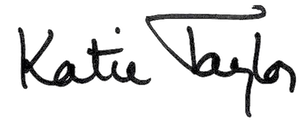 Katie Taylor
Executive Director
Katie Taylor
Executive Director 
Our Response to COVID-19

1.1 million
People receiving WASH and infection prevention supplies, messages, psychosocial support or primary healthcare104,433
Households/people benefitting from direct cash/in-kind financial aid and/or food assistance23,310
Vulnerable populations who are food secure126
Marginalized communities receiving and using health services or public information channels15
Health and nutrition community-led and managed development initiatives9
Activities addressing transparency, anti-corruption, citizen engagement, and service delivery for vulnerable groups65
Cases receiving decentralized legal support in partnership with civil society organizations247
Communities with institutions in place that increase confidence related to rule of law or other police and citizen security actions34
Community security plans for COVID-19 implemented between law enforcement, civil society organizations, and communities

Economic Opportunities
Promoting employability, entrepreneurship, and community development
Learn more
“BEFORE COMMITTING [TO THE JOB], I WAS VERY RESERVED AND SHY,” SAID STEPHANIA SAUREL, HIRED AS THE LEADER OF A 50-PERSON AWARENESS-RAISING TEAM. “NOW IT IS WITH EASE AND ASSURANCE THAT I GO TO PEOPLE TO ADVISE THEM TO WEAR MASKS AND TO WASH THEIR HANDS OFTEN.”
As conditions improved and government restrictions were lifted, the community meetings resumed, and the 10 PCDs were at last completed. Lormil Claudette, a mother of two, had traveled five hours to voice her concerns about the lack of schools where she lives. Like many, Claudette was driven by the hope that she would make a difference in her community.“I BELIEVE THAT MY PARTICIPATION IN THESE COMMUNAL WORKSHOPS CAN LEAD TO REAL CHANGE,” SHE SAID. “I WANT TO TAKE PART IN IT.”
The PCDs are getting people engaged and building assets that will translate to economic prosperity in the future.

3,025 PEOPLE
STRENGTHENED THEIR LIFE SKILLS
THROUGH TRAINING ON
SELF-RELIANCE
COMMUNICATION
LEADERSHIP
TEAMWORK
LEADING TO IMPROVED CAPACITIES
AND BETTER EMPLOYMENT
OPPORTUNITIES.




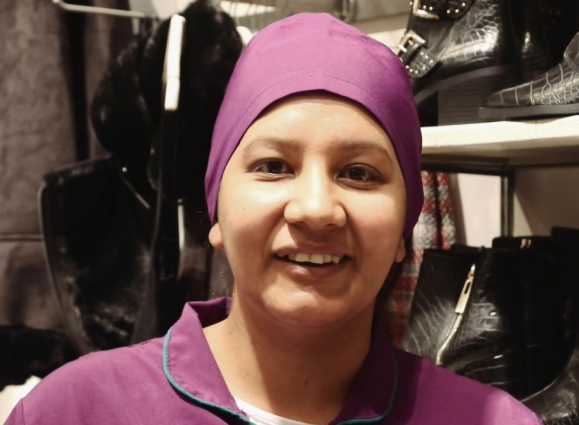 María Elías Romero is a 29-year-old Venezuelan migrant who arrived in Colombia two years ago and lives in Bogotá with her husband and four children. She was a street vendor, selling sweets with her husband to maintain their family. PADF offered legal and psychosocial support along with employability training to help María Elías prepare a résumé, hone her communications skills, and register with a public employment agency. She was matched with a job and is now employed full time, receiving the legal minimum wage.
María Elías Romero is a 29-year-old Venezuelan migrant who arrived in Colombia two years ago and lives in Bogotá with her husband and four children. She was a street vendor, selling sweets with her husband to maintain their family. PADF offered legal and psychosocial support along with employability training to help María Elías prepare a résumé, hone her communications skills, and register with a public employment agency. She was matched with a job and is now employed full time, receiving the legal minimum wage.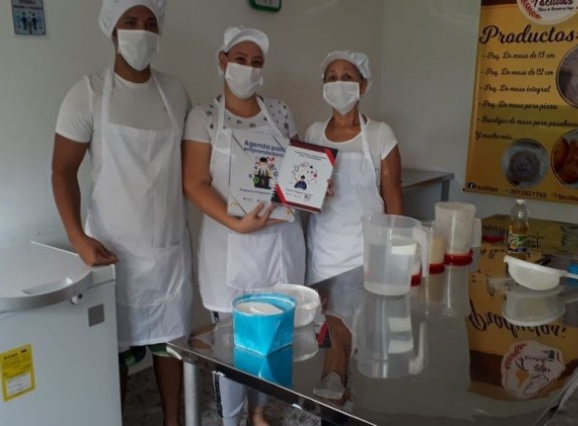 Hilda Sabino Reginfo is a Venezuelan migrant who arrived in Colombia three years ago and settled in Cartagena with her two children, husband, and mother. About a year ago, she decided to start her own business preparing typical Venezuelan corn and flour dough for arepas, empanadas, and pizza. With PADF’s support, she attended a training to sharpen her entrepreneurial skills and learned about the power of social media, door-to- door sales, and other strategies to grow her business. With the revenue of increased sales, Hilda now employs two Venezuelan migrants.
Hilda Sabino Reginfo is a Venezuelan migrant who arrived in Colombia three years ago and settled in Cartagena with her two children, husband, and mother. About a year ago, she decided to start her own business preparing typical Venezuelan corn and flour dough for arepas, empanadas, and pizza. With PADF’s support, she attended a training to sharpen her entrepreneurial skills and learned about the power of social media, door-to- door sales, and other strategies to grow her business. With the revenue of increased sales, Hilda now employs two Venezuelan migrants.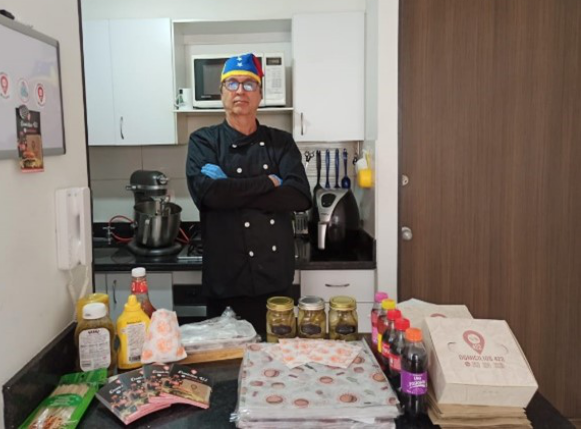 In 2017, Antonio Medina decided to leave Venezuela with his family to search for a better quality of life in Colombia. With time and effort, he was able to open a small fast-food business in Bogotá. In 2020 he participated in trainings offered by PADF and learned how to promote his business using digital marketing tools. These new skills were instrumental during the COVID-19 pandemic and allowed him to engage with his customers and communicate the safety protocols followed by his business during this critical time.
In 2017, Antonio Medina decided to leave Venezuela with his family to search for a better quality of life in Colombia. With time and effort, he was able to open a small fast-food business in Bogotá. In 2020 he participated in trainings offered by PADF and learned how to promote his business using digital marketing tools. These new skills were instrumental during the COVID-19 pandemic and allowed him to engage with his customers and communicate the safety protocols followed by his business during this critical time.IN 2020, PADF REACHED 491 HOUSEHOLDS WITH FOOD ASSISTANCE AND 59 PERSONS WITH SHELTER SUPPORT ACROSS BOTH COUNTRIES.
This emergency support has been critical to ensuring that migrants and refugees were able to access basic rights with dignity as most Venezuelans were excluded from government assistance programs tied to the pandemic.

THESE HEALTH FAIRS PROVIDED BASIC PREVENTIVE HEALTH CARE SERVICES TO
1,774 INDIVIDUALS
OTHERWISE UNABLE TO ACCESS KEY SERVICES
Similarly, PADF prioritized support for pregnant and lactating Venezuelan women, providing prenatal care to migrant women who were unable to access state-covered prenatal services due to a lack of status. As a result, 242 pregnant and lactating women received vital healthcare that ensured their wellbeing and that of their infants. Lastly, as COVID-19 continued to isolate and put unseen pressures on people’s mental health, PADF strengthened its psychosocial care and support services for vulnerable populations. In Colombia, PADF provided 4,698 families with professional psychosocial support, teaching coping mechanisms to better confront existing trauma and the psychological impacts of displacement and isolation during the pandemic.
Disaster Resilience
Building resilient communities and delivering aid during emergencies
Learn more
IN TOTAL, PADF DELIVERED
14,454 POUNDS
of staple foods, personal hygiene products, and cleaning supplies to 270 families, or 1,350 individuals
Meal kits included rice and beans, oats, oil, canned meats, sugar, and other cooking essentials, while personal hygiene and cleaning products included hand sanitizer and soap, laundry detergent, bleach, sanitary napkins, diapers, toilet paper, and reusable protective face masks.“I wish to thank PADF for being here during this emergency, especially since the support provided by the government has not been able to reach all the families affected by the tropical storms. There are many families here that need assistance and thankfully you chose to help our community.” – Román M.


“By engaging government officials, university students and children leaders in direct implementation, PADF has aligned strategic alliances among local actors and built a robust foundation for flood risk reduction measures in San Ignacio and Santa Elena Towns,” said Project Director Dr. Minerva Pinelo.
Environment
Planting the seeds for a greener, sustainable future
Learn more
“WE PLANT BLUE MOUNTAIN COFFEE, WHICH IS HIGHLY PRIZED AND SOUGHT AFTER AROUND THE WORLD BECAUSE OF ITS GOOD QUALITY,” HE EXPLAINED.
Louisma is a project coordinator for Solidarité Haïtienne pour le Développement Rural de Kenscoff (SOHADERK), a local Haitian organization working to address deforestation. In Haiti, economic strain has contributed to a long history of severe deforestation and environmental degradation, but organizations like SOHADERK are disrupting that pattern. They train farmers to use an agroforestry model to plant coffee seedlings and fruit and forest trees on their plots. Planting trees helps to prevent erosion and improve soil conditions, contributing to the long-term sustainability of farmland. The trees also produce high-value cash crops of coffee and fruit that increase farmers’ incomes. Altogether, the model benefits both the farmers and the forests. SOHADERK was one of nine Haitian organizations that received a grant and technical assistance through PADF’s reforestation project. With this support, SOHADERK produced over 400,000 seedlings in their nurseries and trained 347 farmers on topics such as how to install and manage a coffee plot, control shade, space crops when planting, and manage pests.THROUGH THE NINE SUBGRANTEE PROJECTS, OVER
1.3 MILLION
trees were planted, and 407 hectares of land are now managed under agroforestry systems.
PADF also worked with local organization Jardin Botanique des Cayes (JBC) to provide environmental education to students, teachers, and their surrounding communities. JBC trained 70 students in seven schools on the consequences of deforestation, the importance and benefits of trees, and techniques for tree planting and maintenance. Equipped with this new knowledge, these youth will help build a better, greener future for Haiti.

STEM Education
Transitioning to virtual learning and amplifying the role of 21st century skills
Learn more
“EDUCATION PROVIDES A SOCIAL LEVEL PLAYING FIELD, WHICH IS WHY THE GOVERNMENT OF PANAMA IS COMMITTED TO PROMOTING QUALITY EDUCATION FOR ALL. IT IS A GREAT HONOR TO REPRESENT SUCH AN IMPORTANT MISSION. THE PANDEMIC HAS SHOWN THAT WITH INNOVATION AND COOPERATION WE CAN TURN ANY CRISIS INTO AN OPPORTUNITY, AS WE HAVE BEEN DOING. WE MUST UNITE SO THAT STUDENTS FROM OUR REGION HAVE THE EDUCATION THEY DESERVE,” SAID FIRST LADY COLÓN DE CORTIZO.
The official designation event was attended by the First Ladies of Argentina, Brazil, Honduras, and Paraguay, all of whom delivered remarks in support of STEM education.
SINCE MARCH 2020, MORE THAN
56,000 STUDENTS
HAVE PARTICIPATED IN STEM PROGRAMS AND OVER 500 TEACHERS HAVE BEEN TRAINED IN STEM METHODOLOGIES.
PADF’s STEM Americas program is now active in 10 countries: ARGENTINA - BOLIVIA - CHILE - COLOMBIA - ECUADOR - MEXICO - PANAMA - PARAGUAY - PERU - URUGUAY Our STEM education partner in Colombia, the non-profit Cipsela, offered virtual aerospace workshops to more than 100 students between the ages of 12 and 17 in the municipalities of Rionegro, Bello, and La Dorada. In the inaugural My First Satellite and Wing Challenge, Martín Melguizo used what he learned in programming, as well as his previous knowledge in electronics, to build a prototype satellite capable of deploying its panels remotely using sensors and electronics. He then presented the success of his invention to an evaluation committee, further developing his presentation skills – essential in STEM fields. In another challenge, the Large Wing Challenge, Martín managed to build a prototype with a wingspan of 229 centimeters, using only ordinary white paper, by applying the same engineering concepts used in the construction of actual airplane wings. In Argentina and Uruguay, PADF partner Fundación Ciencia Joven offered students the opportunity to participate in an innovative 12-month STEM program, Academias Ciencia Joven en Casa, encouraging them to carry out research and hands-on projects with their peers. By transitioning online, students like Milagros, a 15-year-old girl with Down syndrome from General Ramírez, province of Entre Ríos, in Argentina were able to learn about STEM, teamwork, and leadership skills.
PADF works to close the gender gap in STEM by sparking the interest of girls in science and technology and promoting hands-on learning through our innovative STEM Americas program. To nurture the next generation of women in STEM, we train teachers and develop stimulating lesson plans that ignite curiosity and engage girls in creative ways.
One of them was 15-year-old Laura Ospina of Colombia, who has been enrolled in STEM classes since 2019. She remembers when recruiters from PADF STEM education partner organization Cipsela went to her school to invite students to join a new aerospace workshop. They spoke of airplanes and the space shuttle, among other things. Laura was curious and decided to sign up.
In the past two years, she has learned more than just physics and math concepts, she has learned about aircrafts and how to operate flight simulators. Laura used the Microsoft Flight Simulator X – STEAM Edition to learn how to fly a Boeing 737.

28,556 GIRLS

“I WAS SO EXCITED BECAUSE I HAVE NEVER BEEN IN AN AIRPLANE BEFORE. SOMETIMES THE FLIGHT SIMULATIONS DID NOT GO AS PLANNED, BUT I THINK IT WAS GOOD FOR ME TO EXPERIENCE THAT, BECAUSE THAT HAPPENS IN REAL LIFE.” —Laura Ospina, STEM Americas participant, Colombia


THE PROJECT HAS REACHED
106 BUSINESS OWNERS
IN 2020,
following an in-depth study and a strategy that includes online tools, group training, and individual counselling.
Alba Luz Germán is a young and determined survivor of domestic violence. She is also the owner of Alba’s Bakery, a start-up that received support and is now growing and on the path to the formal economy. Eneyda Alfaro, another young entrepreneur, runs Status, a cosmetics and clothing business. When the pandemic hit, she lost her regular job and signed up for the pilot project. Now, her e-commerce is expanding, and she no longer needs to work for others.“Most businesses are owned by men, but I’ve grown as a person and I’m now independent,”, said Eneyda. “When I worked with other companies, they wouldn’t cover any benefits. For my own employees, I want to fulfill my obligations, and one of my priorities is to register with the national social security system.”



45 children with disabilities
received services from a specialized education center offering
INSTRUCTION AND REHABILITATION SERVICES
To mitigate the health and economic impacts of the pandemic, PADF raised funds for the purchase of groceries and medicines to support these children with disabilities. For six consecutive months, PADF offered financial support to José’s family, ensuring that he received his daily medication and food.
“The support you have given my nephew has helped him a lot because now he is more at ease and my family has one less thing to worry about.”


DOMESTIC WORKERS ARE AMONG THE MOST VULNERABLE GROUPS IN LATIN AMERICA AND WERE DISPROPORTIONALLY AFFECTED BY THE ECONOMIC IMPACT OF THE COVID-19 PANDEMIC. TO MITIGATE THIS SITUATION, PADF DISTRIBUTED FOOD BASKETS TO DOMESTIC WORKERS IN MEXICO.
Gabriela was among those who benefited and said that this help “meant a lot,” since she could meet her family’s basic nutrition needs for the month. In fact, these groceries were shared with her extended family who were unemployed and did not have any support.

“The program has been able to create a space for so many young people from so many backgrounds, without judgement of their circumstances. It’s the first program I’ve encountered that does not discriminate, but accepts and acknowledges young people where they are,”
– Ulana’s coach, Stacey Gordon.
330 YOUTH
WERE TRAINED IN SAINT LUCIA AND GUYANA

HOWEVER, PADF NOT ONLY OUTFITTED DICAR WITH HARDWARE AND SOFTWARE, BUT ALSO DEVELOPED AN INFORMATION AND COMMUNICATIONS TECHNOLOGY (ICT) SYSTEM, KNOWN AS SIDCAR, THAT STRENGTHENS THE ABILITY TO PLAN, ANALYZE, AND DISSEMINATE SECURITY INFORMATION, AND RESPOND TO THE UNIQUE NEEDS OF LAW ENFORCEMENT IN RURAL COMMUNITIES.
Through the ICT application, law enforcement can better receive information from citizens and swiftly respond to and prevent future security challenges. DICAR now has a modern platform, making use of current technologies, to integrate geographical and institutional databases to meet rural citizen security needs and provide effective service.
The program is aimed at:
CRIMINAL JUSTICE STAKEHOLDERS
such as the police, prosecution, and law enforcement authorities
CITIZENS
who may be victims or witnesses of crimes
Unfortunately, many victims and witnesses are unable to participate in the criminal proceedings, significantly impacting case backlog and making it more difficult for cases to be concluded. The relatively small size of Belize and cost of implementing witness protection present additional challenges to the program. PADF has facilitated two high-level virtual roundtable meetings on witness protection and victim care for the criminal justice sector of the Belize Police Prosecution Professionalization Program. The impressive turnout at the meetings indicates a commitment of direct engagement and buy-in by leading stakeholders to ensure the necessary reforms to the legislative framework in the support, assistance, and protection to victims and witnesses, and the effective implementation of existing legislation.



Our Impact
In 2020, PADF was hard at work for the most vulnerable communities in Latin America and the Caribbean



1.1 million
people with WASH and infection prevention supplies, messages, psychosocial support and primary healthcare _____________________ Providing direct cash/in-kind financial aid and/or food assistance to104,433
households/people _____________________ Ensuring that23,310
vulnerable people are food secure _____________________300,180
people received health and nutrition assistance _____________________ Psychosocial support for7,960
people _____________________ Nutrition support for61,032
people _____________________ Humanitarian assistance for87,228
people _____________________ Access to healthcare for143,960
people

4,554
individuals or families _____________________ Helping2,291
familiesadopt environmentally friendly behaviors _____________________69,721
vulnerable people helped adopt preparedness measures to protect lives and livelihood assets _____________________ Supporting17
institutions
3,656
human rights defenders _____________________ Strengthening160+
public or private Institutions _____________________ Supporting advocacy initiatives of60
civil society organizations

1,279
learning products _____________________ Training32,152
people _____________________ Providing direct services to8,089
vulnerable individuals _____________________ Supporting125
institutions
56,567
students reached through STEM workshops and activities _____________________ Promoting gender equality by offering STEM training to28,556
girlsPRIVATE SECTOR
PUBLIC SECTOR
European Union
EUROSANGovernment of Canada
Global Affairs Canada (DFATD)Government of Colombia
Asociación Colombiana del Petróleo (ACP) Agencia Nacional de Hidrocarburos (ANH) Agencia Nacional de Tierras (ANT) Fondo Colombia en Paz Ministerio de Justicia y del DerechoGovernment of Taiwan
Taipei Economic and Cultural Representative Office (TECRO)Government of Sweden
Swiss Agency for Development and CooperationGovernment of the United States
Department of State
Bureau of Conflict and Stabilization Operations Bureau of Democracy, Human Rights, and Labor Bureau of International Narcotics and Law Bureau of Population, Refugees, and Migration Bureau of Western Hemisphere Affairs Office of Economic and Development Affairs Office to Monitor and Combat Trafficking in PersonsUnited States Agency for International Development (USAID)
Bureau for Latin America and the Caribbean, Office of Food for Peace Bureau for Latin America and the Caribbean, Office of Regional Sustainable Development USAID Colombia USAID Eastern and Southern Caribbean USAID Ecuador USAID El Salvador USAID HaitiMULTILATERALS
EX-OFFICIO MEMBERS
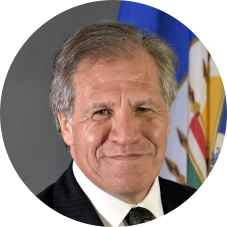
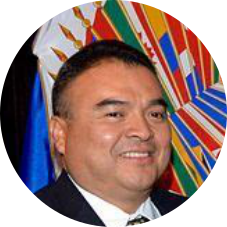


BOARD MEMBERS


2020 ANNUAL REPORT
